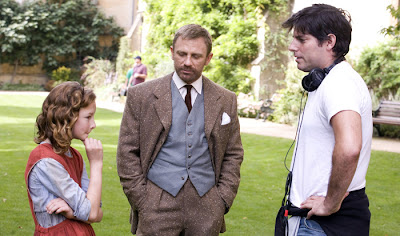
Chris Weitz, writer-director of The Golden Compass, has responded to what he calls the “hatchet-job” on his film in the current issue of the Atlantic Monthly, in a letter posted at BridgeToTheStars.net. An excerpt:
Hana Rosin’s hatchet-job on my film of Philip Pullman’s novel The Golden Compass (and by extension, me) is so comprehensive in its disdain, one might go so far as to imagine she had seen the movie!
She hasn’t, of course, though that fact was not mentioned in her assemblage of carefully cut-and-pasted quotes and surmises pumped up with paraphrase. One is put in mind of a line from the Good Book: “Thou shalt not bear false witness.” For example: it is true that I said that clerics and religious people had been presented as boobs and hypocrites in many Hollywood films in the last few decades. But her statement that this was to me a “solid explanation for why [I’m] not selling out” is entirely her own invention. We were talking about entirely different things at the time during our interview, and the notion that I somehow regard myself as doing the religious right a solid is grotesque.
Elsewhere she simply seems not to have finished her background reading. If she had, when she got to the end of my script she might have noticed that the Genesis story she says I have stricken from the movie is addressed, though in the mouth of the villain Mrs. Coulter. “A long time ago, one of our ancestors made a terrible mistake. They disobeyed the authority. And that is what brought Dust into the world. And ever since then, we’ve been sick. Sick with evil – sick with Dust.” It shouldn’t take much for somebody with half a brain to understand this, and Rosin, who writes about theology, ought to be able to catch it, but evidently it didn’t suit her thesis, which is that I “sold out” the book I happen to love. What did I sell? Who sold the rights to the books? Not me. . . .
In other news, my CT Movies colleagues Josh Hurst and Mark Moring have asked why the Christian community that was so accommodating to The Da Vinci Code (2006) has suddenly turned against The Golden Compass. I can think of a few reasons:
- The Golden Compass has been marketed as a children’s story, whereas The Da Vinci Code was ostensibly for adults.
- The Golden Compass had lots of fans among sci-fi and fantasy buffs, but it was never a household word — at least not in North America — whereas The Da Vinci Code was such a popular and hotly-debated novel that the Christian community had time to resign itself to the inevitability of the movie.
- The Golden Compass is explicitly about the death of God, whereas The Da Vinci Code at least pretends to be on the side of Jesus.
That said, the two books do share a contempt for the church, especially in its Roman Catholic form, as well as a high esteem for the liberating spiritual power of sexuality — even if Philip Pullman personally finds the word “spiritual” somewhat revolting. So the two books do reflect the era in which they were written in a rather similar way, and thus one could argue that they do deserve similar kinds of responses.












